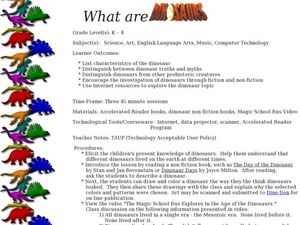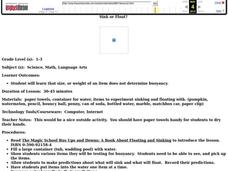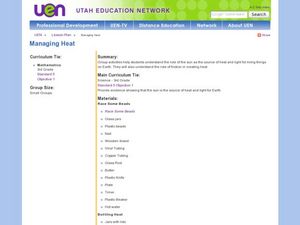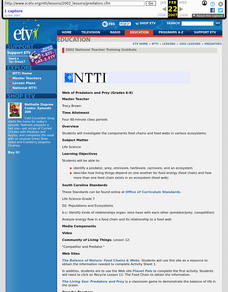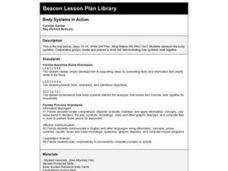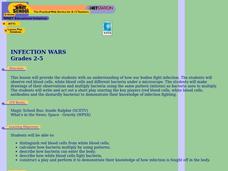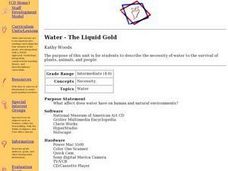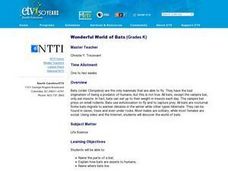American Museum of Natural History
Paleontology Books
A list of 11 books about paleontology offers titles, authors, and a brief description of the tale.
Curated OER
The Amazing Ant
Students explain that ants are an important element of nature's balance. Ants eat many insects and are food to other animals. They watch a video and conduct hands-on activities that give them an excellent overview of the ants role in...
PBS
Exploring Earthquakes: Earth Foldable
Geology junkies will make a foldable that covers a lot of ground regarding Earth's internal structure, its position in the solar system, and an explanation for its seasons. Templates and a printable page of instructions are included....
Curated OER
A Honey of a Hexagon
Students explore how bees make honey and why the hexagon is the best basic pattern for the honeycomb through the use of a video and hands-on activities with honeycombs and geometric shapes.
Curated OER
To Rot or Not!
Students discover that composting helps reduce landfill waste and is good for the soil. They explore the techniques of composting through a variety of media, art activities and hands-on experience.
Curated OER
What are Dinosaurs?
Learners explore the attributes of dinosaurs. In this dinosaur lesson, students read books and watch videos featuring dinosaurs. Learners also research dinosaur traits using Internet sources.
Curated OER
What Happens to the Food You Eat? The Digestive System
Students observe a video displaying body parts and functions of the digestive system. They make drawings of the digestive system from their observations. They act out a short play involving body parts.
Curated OER
Aerosol Lesson: Language Arts
Students construct a model of a volcano. They read "NASA Facts Atmospheric Aerosols" and discuss the impacts of volcanic eruptions. They write informative essays about how aerosols impact the Earth.
Curated OER
Sink or Float?
Young scholars predict and test different items to see if they sink or float. In this sink and float lesson plan, students predict whether an item is buoyant or not, and learn that size and weight do not matter when it comes to buoyancy.
Curated OER
Explosive Ideas: Oregon quarter reverse
Explore Earth and her amazing layers with this lesson on planetary change. Young scholars will research the ways in which Earth's layers cause change. They will complete a "Tectonic Puzzle" and use a worksheet to answer questions about...
Curated OER
HOW BODY SYSTEMS INTERACT
Students study that the human body is made up of different systems whose functions are related. They draw and label their traced body outlines which include at least five body systems.
Curated OER
Water Treatment Plant
Second graders create their own water treatment system. In this water treatment activity, 2nd graders create the water treatment system and record how it works. Students list materials they used and write about what they saw. Students...
Curated OER
Would You Like A Desert With That?
Students explore the four different deserts in the United States and their characteristics. They discuss the four different types of deserts in United States and their characteristics, and locate them on a map.
Curated OER
The Wonderful world of Water
First graders examine the water cycle through readings and experiments. In groups, they conduct interviews with others and use the information to create a chart displaying the various uses of water. After brainstorming lists of ways to...
Curated OER
Spider Body Parts
Students identify spider body parts. In this arachnid lesson, students review the story Amazing World of Spiders and discuss the various spider body parts. Students fill in the correct body parts on a copy of a blank spider diagram....
Curated OER
Water Cycle
First graders research for information on the water cycle. They use a hot list to find pictures of the water cycle, and create a movie in Kid Pix about the water cycle.
They present Kid Pix movie to the class.
Curated OER
An Emerald Place
Students discover four layers of the rain forest and identify the life of animals at each level.
Curated OER
WEAVING TECHNOLOGY INTO THEMATIC UNITS T.O.O.L.S. 2000
Third graders utilize computers and other technology to explain the solar system. Ten different stations involve students through laserdisc, research, art, GeoSafari, space toys, and the computer.
Curated OER
Managing Heat
Third graders perform various experiments to show the flow of energy that causes heat. In this heat activity, 3rd graders understand how heat is transferred or trapped. Students use the scientific method and critical thinking skills to...
Curated OER
Web of Predators and Prey
Students investigate the components food chains and food webs in various ecosystems. They describe how living things depend on one another for food energy (food chain) and how more than one food chain exists in an ecosystem
Curated OER
Body Systems in Action
Fifth graders, in groups, create a short skit that shows how body systems work together.
Curated OER
Infection Wars
Students explore how our bodies fight infection. Using a microscope, they observe red blood cells, white blood cells and different bacteria under a microscope.
Curated OER
Water-The Liquid Gold
Students investigate the necessity of water for the survival of plants, animals, and people. They explore the affect that water has on human and natural environments through literature, field trips, and discussions.
Curated OER
Wonderful World of Bats
Students create a book about bats. They write a letter to a scientist containing questions about bats. They compare the socialization of bats to humans; compare the needs of bats to humans and other animals.
Other popular searches
- Magic School Bus Books
- The Magic School Bus
- Magic School Bus Lessons
- Magic School Bus Ocean
- Magic School Bus Technology
- Magic School Bus Wet All Over
- Magic School Bus Plays Ball
- Magic School Bus Lost in Space
- Magic School Bus Video
- Magic School Bus for Lunch
- Magic School Bus Gets Eaten
- Magic School Bus Ocean Floor







